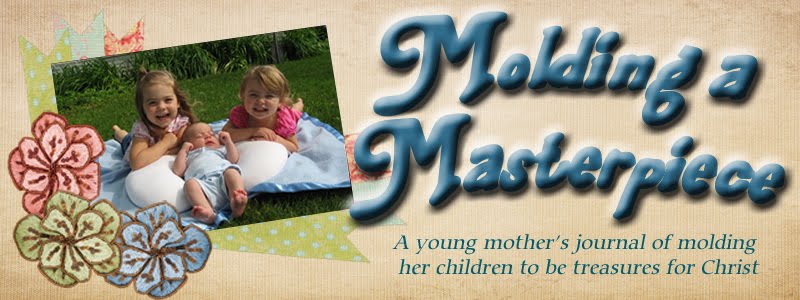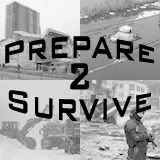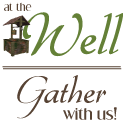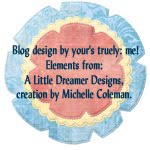*How do you think learning should happen?
I would like to incorporate good literature instead of some textbooks, as well as hands on learning. Program/curriculum needs to be flexible to meet individual needs and desires.
*How do you want to teach or "run your school"?
1. Do you want to try to teach most of all of your children together, at least for some subjects?
Absolutely! To make the most of my time I would like to at least teach history, literature, science, and foreign languages together.
2. How much of the time do you want (or are you able ) to work directly with your children?
All morning most likely, with some time in the afternoon maybe.
3. How much of the time do you expect your children to work independently?
Currently, none to very, very little. Each year more and more so that by highschool the majority of their work may be independent.
4. Do you want to use real books (biographies, historical novels, books written about particular science topics, etc.) as part of your curriculum?
YES!
5. Do you want to include field trips? What type of field trips?
Yes! Visiting places that relate to what we are learning about and educational family vacations (such as learning USA geography by visiting all lower 48 states. Visiting historical and scientific locations).
6. Do you like to "make up" curriculum as you go, adapting to the needs and interests of your children, or do you prefer things well planned out in advance?
Some of each. A suggested guideline might be nice with flexibility to add and change what I wish.
7. Do you need a set schedule to get things done, or would you prefer more flexibility?
A fairly set schedule to provide consistency, but flexibility to deal with life's surprises.
8. Do you prefer a curriculum that is thoroughly laid out with lesson plans that tell you what to do when or do you prefer just an outline to follow?
A general outline would work well as I will probably change and adapt some as we go.
9. Any additional thoughts about how you want to operate?
I would like to "do school" year-round. I'd also like to take advantage of "outside" classes for some subjects and sports.
OK, so now how does this fit with the different educational methods? Well, Cathy Duffy, in her book, has a chart that helps you evaluate how your philosophy compares to the different methods. Here are my scores:
Traditional - 3 points =27%
Charlotte Mason - 11.5 points = 74%
Classical - 11 points = 75%
Unit Study - 12.5 point = 73%
Unschooling - 10 points = 59%
Independent Study - 5 points = 42%
Eclectic - 11 points = 61%
Umbrella Program - 4 points = 36%
(for explanations of methods please see Cathy Duffy's book, 100 Top Picks for Homeschool Curriculum.)
As you can see Charlotte Mason, Classical, and Unit Study basically tied for me. I like the literature based approach and narration of Charlotte Mason. Of the Classical method, I like the emphasis on critical thinking, communication skills, and the three stages of learning (the Trivium). And I would love to incorporate Unit Studies in teaching history, literature, and science for all three of our children.
Based on all this I have quite a list of curriculum that Cathy reviewed in her book, that I would like to explore further.
Visit www.cathyduffyreviews.com for curriculum reviews in addition to her book.
Saturday, January 31, 2009
Educational goals for my children
I want my children to:
*have a strong sense of God's reality in all aspects of their education and to honor Him in all things.
*love to learn so they will become life-long self-educators.
*have an excellent knowledge of Scripture.
*have a strong Biblical worldview.
*develop excellent reading skills.
*develop excellent language and communication skills.
*develop excellent critical thinking skills.
*develop good people skills.
*develop good work and study habits.
*develop a heart to serve others.
*have a broad education that will prepare them for college and give them many possibilities for their future.
*have exposure to the arts.
*read widely from both classic and good books.
*be physically fit.
*be equipped to succeed in our modern world.
*have a strong sense of God's reality in all aspects of their education and to honor Him in all things.
*love to learn so they will become life-long self-educators.
*have an excellent knowledge of Scripture.
*have a strong Biblical worldview.
*develop excellent reading skills.
*develop excellent language and communication skills.
*develop excellent critical thinking skills.
*develop good people skills.
*develop good work and study habits.
*develop a heart to serve others.
*have a broad education that will prepare them for college and give them many possibilities for their future.
*have exposure to the arts.
*read widely from both classic and good books.
*be physically fit.
*be equipped to succeed in our modern world.
100 Top Picks for Homeschool Curriculum by Cathy Duffy
As I was researching different methods of homeschooling, I came across this book by Cathy Duffy. The purpose of this book is to help parents discover what methods of teaching (ie: classical, Charlotte Mason, tradition, unschooling, etc.) best suite them, and what curriculum choices best suite their style of teaching and their children's style of learning. It has saved me a lot of time, by narrowing my choices down so I don't have to spend time researching methods that I don't agree with. I highly recommend it to any new-to-homeschooling parent, and I'm sure it would even benefit those who have been homeschooling for some time. This book also causes you to stop and really think through what you want for your children; so if you borrow the book from the library, or you don't want to write directly in the book itself, make sure that you have a notebook handy to write things down in. In the next few posts I will give my answers to the questions in chapter two that help to evaluate which method(s) are right for me.
Thursday, January 8, 2009
Education methods - Classical
Method - Classical
Source - The Well-Trained Mind : A Guide to Classical Education at Home by Jessie Wise and Susan Wise Bauer.
Classical education is broken down into three parts - the pattern that is called the Trivium. The first is the Grammar stage. This is were the foundation for learning is laid. Instead of focusing on creative expression, the grammar stage student (approx. 1st though 4th grades) learns facts: rules of spelling, phonics, grammar, the facts of math, stories of history and literature, names and descriptions of plants and animals and human body, and the vocabulary of foreign languages. At this age the child's mind is a sponge ready to absorb information and even finds memorizing fun. "Your job, during the elementary years, is to supply the knowledge and skills that will allow your child to over flow with creativity as his mind matures."
The second stage is the Logic stage when a child's mind begins to think more analytically. The middle school age student wants to know why and can think more in abstract. Here the student learns how the facts learned in the Grammar stage fit together. For example, the child learned of the war of 1812 in the Grammar stage, now he uses those facts to learn why the war was fought. Now is the time for critical thinking.
The third stage is the Rhetoric stage. "The student of rhetoric applies the rules of logic learned in middle school to the foundations information learned in the early grades and expresses her conclusions in clear, forceful, elegant language." Now is the time for self-expression.
The authors also stress that a classical education is more than a pattern of learning. It is also language focused vs. image focused which causes the mind to be active vs. passive. Also, all knowledge is interrelated.
In summary: "The mind must first be supplied with facts and images, then given the logical tools for organization of those facts and images, and finally equipped to express conclusions."
Source - The Well-Trained Mind : A Guide to Classical Education at Home by Jessie Wise and Susan Wise Bauer.
Classical education is broken down into three parts - the pattern that is called the Trivium. The first is the Grammar stage. This is were the foundation for learning is laid. Instead of focusing on creative expression, the grammar stage student (approx. 1st though 4th grades) learns facts: rules of spelling, phonics, grammar, the facts of math, stories of history and literature, names and descriptions of plants and animals and human body, and the vocabulary of foreign languages. At this age the child's mind is a sponge ready to absorb information and even finds memorizing fun. "Your job, during the elementary years, is to supply the knowledge and skills that will allow your child to over flow with creativity as his mind matures."
The second stage is the Logic stage when a child's mind begins to think more analytically. The middle school age student wants to know why and can think more in abstract. Here the student learns how the facts learned in the Grammar stage fit together. For example, the child learned of the war of 1812 in the Grammar stage, now he uses those facts to learn why the war was fought. Now is the time for critical thinking.
The third stage is the Rhetoric stage. "The student of rhetoric applies the rules of logic learned in middle school to the foundations information learned in the early grades and expresses her conclusions in clear, forceful, elegant language." Now is the time for self-expression.
The authors also stress that a classical education is more than a pattern of learning. It is also language focused vs. image focused which causes the mind to be active vs. passive. Also, all knowledge is interrelated.
In summary: "The mind must first be supplied with facts and images, then given the logical tools for organization of those facts and images, and finally equipped to express conclusions."
Subscribe to:
Posts (Atom)










